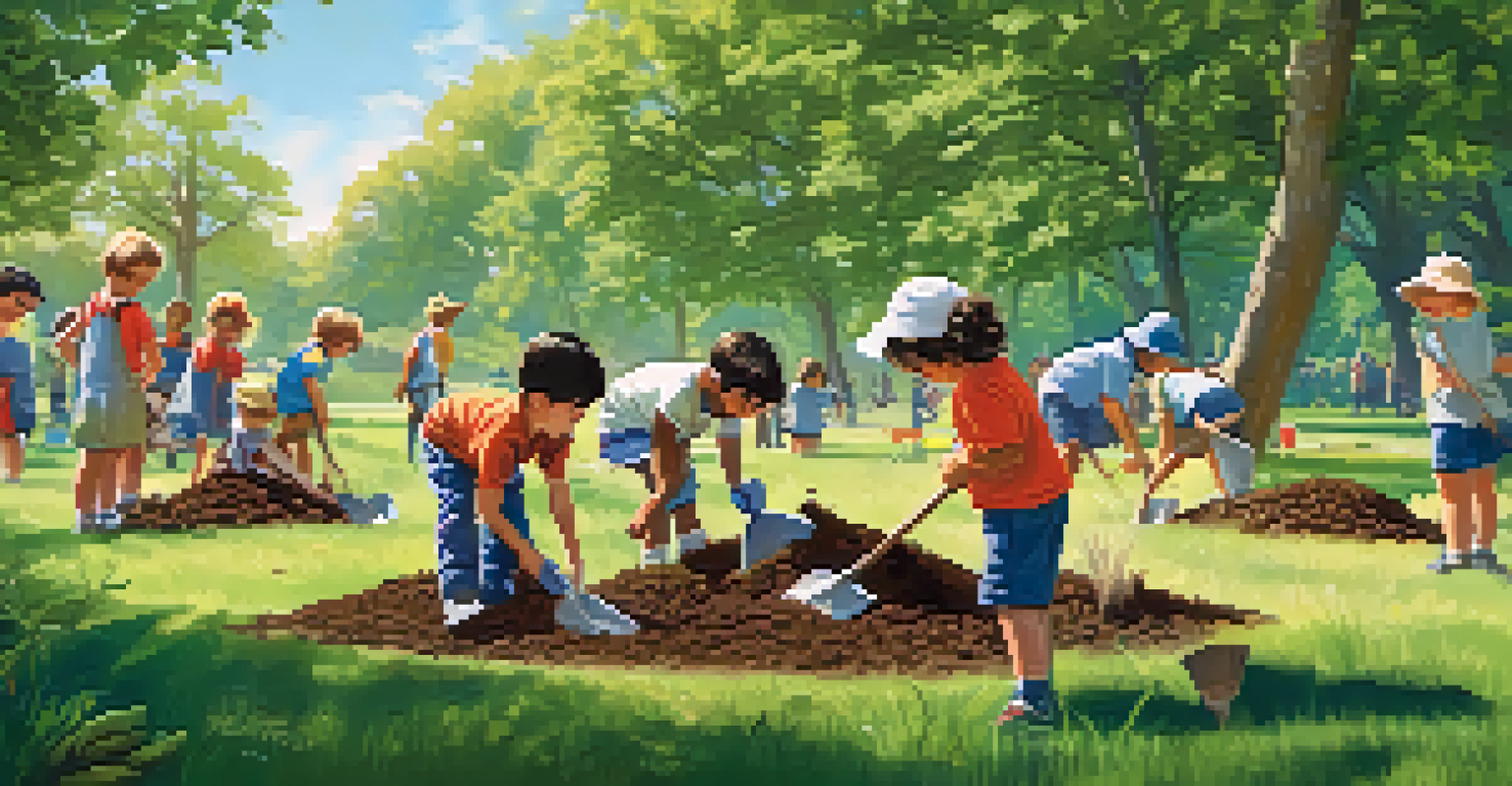The Importance of Outdoor Education for Arizona Youth

Understanding Outdoor Education and Its Benefits
Outdoor education encompasses learning experiences that take place outside the traditional classroom. It involves hands-on activities, exploration, and engagement with nature, allowing students to connect with their surroundings in a meaningful way. This type of education goes beyond textbooks, fostering practical skills and critical thinking.
The best way to find yourself is to lose yourself in the service of others.
For Arizona's youth, outdoor education offers unique benefits, especially with the state's diverse landscapes, from deserts to mountains. These experiences not only promote environmental awareness but also help students appreciate the beauty and complexity of their natural world. By immersing themselves in outdoor settings, children can develop a lifelong love for the environment.
Moreover, outdoor education encourages social interaction and teamwork among peers. Through group activities like hiking or camping, students learn to communicate effectively, solve problems collaboratively, and build lasting friendships. This social aspect is crucial, as it helps cultivate a sense of community and belonging, which is essential for emotional development.
Enhancing Physical Health Through Outdoor Activities
Engaging in outdoor education significantly boosts physical health for Arizona's youth. Activities like hiking, biking, or rock climbing promote fitness and help combat the rising rates of childhood obesity. The natural setting encourages kids to be active, often without realizing it, as they focus on exploration and adventure.

Additionally, spending time outdoors has been linked to improved mental health. Fresh air and physical activity can reduce stress levels and symptoms of anxiety and depression. For many students, the hustle and bustle of daily life can be overwhelming, and outdoor education provides a refreshing escape that rejuvenates both body and mind.
Enhances Academic Performance
Experiential learning through outdoor education improves students' retention of information and motivation in their studies.
Furthermore, exposure to sunlight helps children absorb essential vitamin D, which is crucial for bone health and immune function. In Arizona, where sunshine is abundant, outdoor education offers the perfect opportunity for youth to soak up those rays while engaging in fun, physical activities that promote overall well-being.
Fostering Environmental Stewardship in Youth
Outdoor education plays a pivotal role in cultivating environmental stewardship among young people. By connecting students with nature, they develop an understanding of ecological principles and the importance of preserving their environment. This awareness is essential in today’s world, where environmental issues are at the forefront of global discussions.
In every walk with nature one receives far more than he seeks.
Programs that focus on outdoor education often include hands-on conservation projects, such as tree planting or habitat restoration. These activities not only teach kids about ecosystems but also empower them to make a positive impact. When students see the direct results of their efforts, they feel a sense of ownership and responsibility toward their environment.
In Arizona, where unique ecosystems are at risk, fostering a generation of environmentally conscious youth is crucial. As these children grow into adults, the values and lessons learned through outdoor education can influence their decisions and actions, leading to a more sustainable future for the state.
Developing Life Skills Through Outdoor Challenges
One of the remarkable aspects of outdoor education is its ability to teach essential life skills through experiential learning. Activities that challenge students physically and mentally, such as rock climbing or navigating a trail, encourage resilience and perseverance. These challenges help young people learn to overcome obstacles, which is a valuable lesson applicable to many areas of life.
Moreover, outdoor education fosters problem-solving skills as students encounter unexpected situations in nature. Whether it’s dealing with changing weather or planning a camping trip, these experiences teach kids how to think on their feet and adapt to new circumstances. Such skills are vital, as they prepare them for the unpredictability of adult life.
Outdoor Education Boosts Health
Engaging in outdoor activities promotes physical fitness and enhances mental well-being for youth.
Additionally, teamwork and leadership skills are often developed during group activities in outdoor education. Students learn to communicate, delegate tasks, and support one another, all of which are essential for success in both personal and professional relationships. These skills become lifelong assets that can significantly benefit them in their future endeavors.
Boosting Academic Performance with Outdoor Learning
Research indicates that outdoor education can enhance academic performance among students. Engaging in hands-on learning experiences helps solidify concepts in subjects like science and geography. When students can observe and interact with the material in a real-world context, they often retain information better than through traditional classroom methods.
In Arizona, the rich biodiversity and unique geological features provide an excellent backdrop for learning. Field trips to national parks or nature reserves can supplement classroom lessons, making subjects come alive. This approach not only makes learning more enjoyable but also sparks curiosity and a desire for further exploration.
Furthermore, outdoor education can boost students' motivation and engagement in their studies. When they see the relevance of what they’re learning in the natural world, they are more likely to take an interest in their education. This newfound enthusiasm can lead to improved grades and a more positive attitude toward learning overall.
Encouraging Cultural Awareness and Appreciation
Outdoor education also serves as a platform for promoting cultural awareness and appreciation among Arizona's youth. Many outdoor programs incorporate lessons about the indigenous peoples of the region, their histories, and their relationships with the land. This helps students develop a deeper understanding of the diverse cultures that have shaped Arizona.
By participating in outdoor education, students gain insight into traditional practices and beliefs connected to the environment. This knowledge fosters respect and appreciation for different cultures, promoting inclusivity and empathy. Understanding various perspectives is crucial in today’s multicultural society, and outdoor education provides a unique avenue for this exploration.
Fosters Environmental Stewardship
By connecting students with nature, outdoor education cultivates a sense of responsibility towards the environment.
Moreover, outdoor education can encourage students to form their own connections with the land, leading to a personal sense of identity. By experiencing the natural beauty of Arizona firsthand, they can develop pride in their heritage and a commitment to preserving it for future generations. This cultural connection enriches their lives and strengthens community bonds.
The Role of Community in Outdoor Education
Community involvement is vital for the success of outdoor education programs. Local organizations, schools, and families can collaborate to create enriching experiences for youth. By pooling resources and expertise, they can provide a broader range of activities and opportunities for students to engage with nature.
In Arizona, various nonprofits and community groups offer outdoor education programs that cater to different age groups and interests. These organizations often provide scholarships or free events, ensuring that all children have access to the benefits of outdoor learning, regardless of their economic background. This inclusivity is essential for fostering a love for the outdoors among diverse populations.

Additionally, community support helps to raise awareness about the importance of outdoor education. By advocating for these programs, community members can encourage schools to incorporate more outdoor learning into their curricula. This collective effort can lead to a lasting change in how education is approached, highlighting the value of experiential learning in shaping well-rounded individuals.